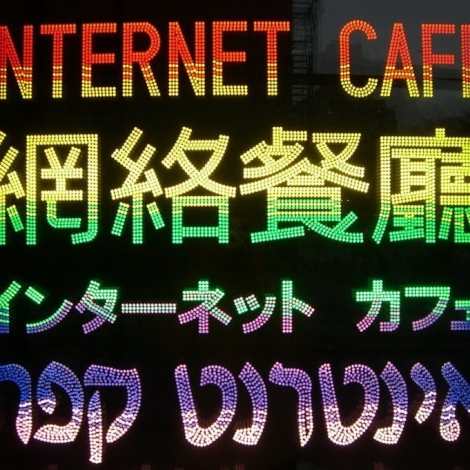A sign at an Internet cafe in New York City, New York, USA. Photo by Scuruzu / Flickr
Opinions have flourished in the days following Mark Zuckerberg’s announcement that facebook co-founded Internet.org to connect five billion people worldwide who do not have Internet access. Analysts and news outlets weighed in with positions ranging from “good work” to “good marketing.” Comments on Zuckerberg’s post on Facebook and also on Internet.org’s YouTube video lean toward cynicism: “Who needs water when we have internet :D.” But even among the typically biting commentary found on YouTube and even Facebook, the diversity of views is telling.
Zuckerberg explains his motives in his article, “Is Connectivity a Human Right?” (pdf) and in a press release accompanying the announcement.
“Everything Facebook has done has been about giving all people around the world the power to connect,” Zuckerberg said in a statement. “There are huge barriers in developing countries to connecting and joining the knowledge economy. Internet.org brings together a global partnership that will work to overcome these challenges, including making internet access available to those who cannot currently afford it.”
“…the big questions [are], Will a cheaper ‘eco-data’ smartphone be able to drive users to demand 3G in their areas, and then [will] the service providers expand their 3G networks?” – Bruce Baikie, Executive Director of Inveneo.
But his comments have churned speculation rather than quell it.
To summarize the project, Facebook joins six other tech companies, Ericsson, MediaTek, Nokia, Opera, Qualcomm and Samsung, in an attempt to vastly increase Internet access.
First, they will try to lower the cost of providing access. Some of their targets include technology to amplify data signals inside buildings, and they would like to appropriate white space spectrum– the unused spectrum reserved for TV and radio.
Second, the companies will try to streamline applications, slim them down to cut their data requirements.
And third, they would like to make it easier for people pay for access, working with the pay-as-you-go business models prevalent in developing countries.
Reaction among experts has been thoughtful, skeptical, practical, or some combination of the three.
An Internet cafe found at a home in Bangkok, Thailand. Photo by stevec77 / Flickr
Pulkit Grover / Carnegie Mellon University
In comments to the mailing list for Technology and Infrastructure for Emerging Regions (TIER), a research group at the University of California, Berkeley, Pulkit Grover, an assistant professor of Electrical and Computer Engineering at Carnegie Mellon University in Pittsburgh, Penn., highlighted a possible unintended benefit of the plan.
“It seems that Zuckerberg is also advocating use of spectrum white spaces for the endeavor. If heavily advertised, this could have the welcome side-effect of bringing attention to white spaces to different countries. In India, for instance, the issue is only beginning to be looked at seriously (based on my recent conversations with IITB faculty),” Grover says.
Dan Gillmor / The Guardian
The effort “worthy,” but not as urgent as Internet freedom. Freedom, that is, from censorship and prying eyes – both government and corporate, Dan Gillmor writes in The Guardian.
“What the developing world – and increasingly, the developed world – needs now are platforms that companies and governments can’t lock down or control. Sorry to say, I don’t look to the tech industry to launch splashy initiatives to research and develop that,” Gillmor writes.
“If heavily advertised, this could have the welcome side-effect of bringing attention to white spaces to different countries” – Pulkit Grover, Assistant Professor of Electrical and Computer Engineering at Carnegie Mellon University
Alexis Madrigal / The Atlantic
Alexis Madrigal at The Atlanticparses Internet.org’s video and condemns the organization for depicting Internet access as a high-minded, noble goal rather than simply a good business decision.
“…We shouldn’t have to worship web products, or the people who make them, or the values they hold, to use the Internet,” Madrigal writes.
Assane Gueye / University of Maryland / NIST
Better connectivity is a fine goal, but it could also lead to a lot of wasted time, Assane Gueye, a research associate in electrical and computer engineering at the University of Maryland in College Park and a postdoc researcher at the US National Institute of Standards and Technologies, told TIER. Gueye has seen computer cafes full of time wasters in his native country of Senegal, he says.
“Maybe Facebook should start by studying the current social impacts of the Internet (the goods and the not-so-goods). This will certainly help set the priorities,” Gueye says.
“The problem is not to bring Internet to the people, the problem is what they are going to do with it to have a better quality of life. I would rather vote for a program (with a sustainability plan) to help school kids learn how to ‘usefully’ use the Internet!”
Bruce Baikie / Inveneo
Bruce Baikie, Executive Director of Inveneo, a non-profit organization that delivers sustainable computing technologies and broadband to communities in developing countries, calls Facebook the main driver for traffic in those regions. In his experience, everyone signs into Facebook in Internet cafes that he has visited and everyone uses it as their primary communication tool, he told TIER.
“The problem, as I see it, is the 3G networks are only in the main cities. As an example, in Port-au-Prince, Haiti, you can get 3G in from several providers, but drive five miles out of town and nothing from anyone, only 2G or voice and SMS. The 3G network is only where the money is and the cost to build out 3G in rural [areas] is preventing expansion. The service providers do not see a market for data in rural areas. So the big questions [are], Will a cheaper ‘eco-data’ smartphone be able to drive users to demand 3G in their areas, and then [will] the service providers expand their 3G networks?” Baikie says.
Students work at an Internet cafe at Lesotho College in Maseru, Lesotho. Photo by OER Africa / Flickr
Vindu Goel / New York Times
Vindu Goel, writing for The New York Times, characterized Intnernet.org as an inevitable move to capture emerging markets.
“These companies have little choice but to look overseas for growth. More than half of Americans already use Facebook at least once a month, for instance, and usage in the rest of the developed world is similarly heavy. There is nearly one active cellphone for every person on earth, making expansion a challenge for carriers and phone makers,” Goel writes.
Srinivasan Keshav / University of Waterloo
Srinivasan Keshav, professor of computer science at the University of Waterloo in Waterloo, Ontario, Canada, told the TIER group that Internet.org and Internet access in general has the potential to be a force for development, but it should not be uncritically acclaimed.
“Even the best-intentioned action, when carried out without adequate care, can lead to indifferent or negative results. We need to ensure that this initiative learns from the successes of the past, such asmPesa, and avoids making the same mistakes as many others. [Editor’s note: The link points to an IEEE Xplore paper posted in May, 2006: Creating and Selling the Low-Cost Computer. The paper discusses the Simputer (Simple Inexpensive Multilingual Computer), a PDA-type device developed in Bangalore, India, and the Computador Popular, a low-cost computer in Brazil, neither of which have caught on in their intended markets.]
“Part of the debate here arises, I believe, from a certain degree of confusion between the short and long term effects of technology on society. In the short term, technology benefits the elite, who are better able to grasp its potential. Thus, in the short term, technology tends to accentuate economic divisions by enriching the rich even if not actively impoverishing the poor. In contrast, over the long term, some technologies can improve the overall good. As costs drop and accessibility improves, the decrease in transactive friction can add economic value that helps all economic classes,” Keshav says.
Kurtis Heimerl / University of California, Berkeley
Kurtis Heimerl, a graduate student of computer science at the University of California, Berkeley. Facebook is not obligated to do the most helpful thing possible with its money, Kurtis Heimerl, a graduate student of computer science at the University of California, Berkeley, said in response to arguments that the funds would be better spent providing basic necessities such as food and water.
“It’s not going to solve all of the problems. However, as far as development projects go, I think it has a lot more merit than others in the tech space. This isn’t a bunch of technologists in Silicone Valley deciding that what the global south needs is ‘mapping,’ or ‘geo,’ or whatever. People in the developing world actually use this in their lives and to their benefit. That’s such a good starting point.
“Facebook does help people keep in touch with friends and family and that is an important use case. It’s one of the primary drivers of the technology. This is the ho-hum day-to-day use of the system for a lot of people throughout the world. We’re not fomenting a revolution; we’re organizing a soccer game. It helps with that,” Heimerl says.
Facebook weighs in
Skepticism trended heavily in the top comments on Zuckerberg’s Facebook post about the new initiative, but a few people lent encouragement. This is a snapshot of the top comments as of publication.
We’d love to hear opinions from E4C members and other readers. What do you think?





